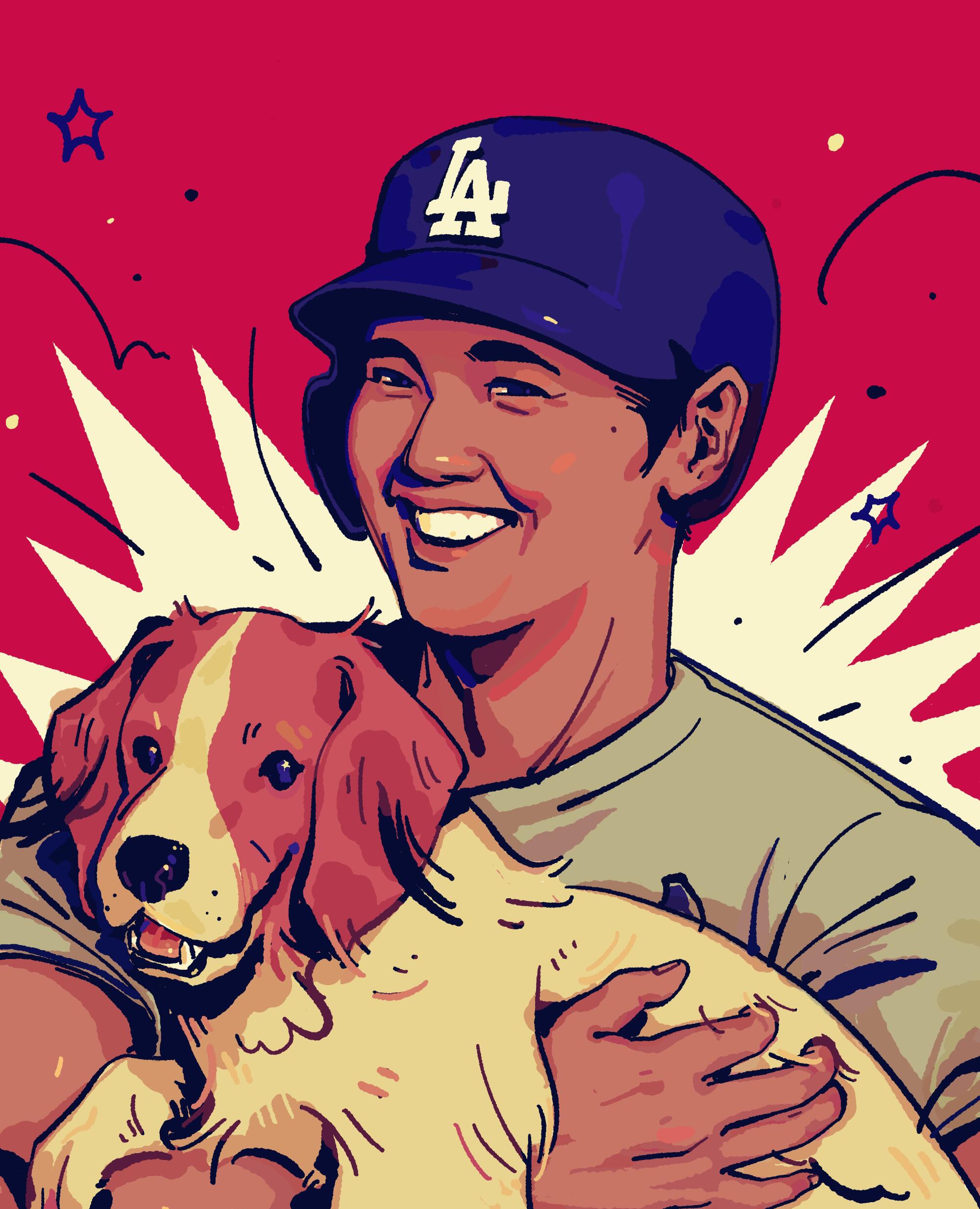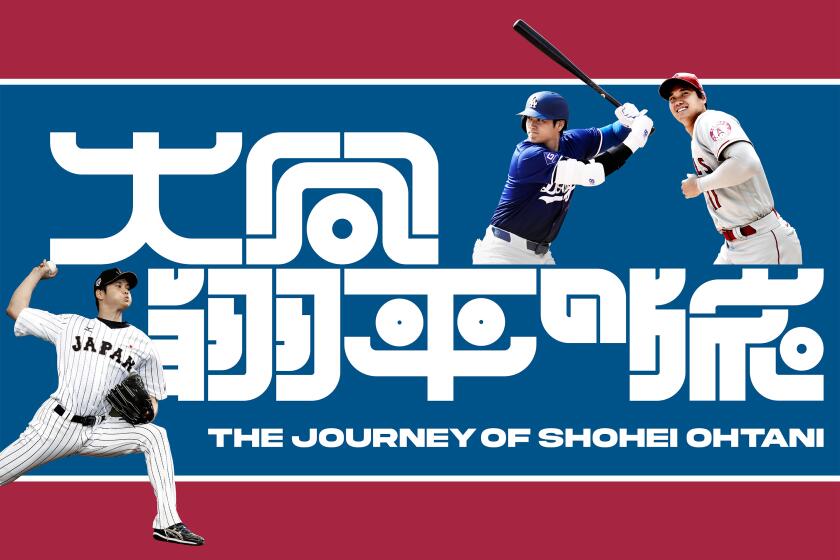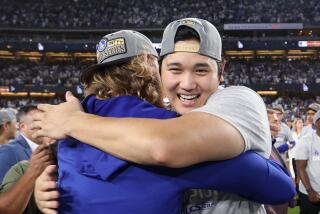
Shohei Ohtani didn’t share many details about his reunion with Mike Trout this month.
“Normal,” he said in Japanese of their meeting at the Dodgers’ spring-training stadium.
Ohtani said Trout and other Angels players congratulated him on the $700-million contract he signed with the Dodgers. He said he and Trout asked about each other’s families.
And that was about it.
Except there was more, some of which was revealed by a video that was uploaded to the Angels’ Instagram account.
The recording showed Trout marching toward Ohtani with a bag over his shoulder and a smile on his face.
“My buddy!” Trout called out.
Ohtani and Trout clasped right hands, and pulled each other in for an embrace. They continued smiling over a minute-long conversation, as well as the obligatory photograph opportunity that followed.
If a picture is worth a thousand words, how many is a video worth? Or a GIF, a file that presents multiple frames of a sequence of images?
In the case of Ohtani, these images have transformed him from a baseball player to celebrity — even outside his home country.
Ohtani doesn’t speak English publicly, communicating with American audiences through an interpreter.
Even in his native Japanese, Ohtani speaks cautiously. Most of his interactions with reporters are entirely unremarkable — or, as he likes to say, “normal.”
He’s no Muhammad Ali.
But he doesn’t have to be to transcend his sport. Social media content can say for him what he won’t say himself.
Ohtani is baseball’s first superstar of the digital era. How he is perceived has been shaped by the videos, GIFs and pictures of him that have spread around the internet during the last six-plus years.
The recording of the meeting with Trout, for example, showed a genuine warmth between the two former American League most valuable players.
Trout’s reaction to seeing Ohtani, as well as the reactions of others players in separate videos, is evidence of how well-liked Ohtani was as a teammate.
Something else: Ohtani’s interpreter was nearby, but Ohtani didn’t require his help to communicate with his former teammates.
In previous times, an athlete as professionally dedicated and privately guarded as Ohtani would be viewed as a robot. Today, he’s seen as playful and good-natured.
His first viral moment in the major leagues came in 2018 — early in his first season with the Angels. After homering for the first time, Ohtani returned to the dugout to find the entire team ignoring him. As his teammates continued to give him the silent treatment, Ohtani raised his arms and waved them. Finally, he grabbed Ian Kinsler from behind and started jumping up and down, which resulted in the team mobbing him.
Cameras immediately fell in love with Ohtani, and not just because of what he could do on the field. He was good looking. He had a wonderful smile. He had an expressive face.
GIFs were produced of Ohtani performing CPR to his bat while in a slump, of him telling a pitcher not to worry after striking him out with a pitch, of him on the bench doing tricks with baseballs, of him pointing a baserunner to the dugout after he beat him to first base.
Ohtani’s competitive side was also displayed. Ohtani screaming after striking out a batter. Ohtani flipping his bat when homering. Ohtani punching the air after scoring a run.
Before the championship game of the World Baseball Classic last year, Ohtani made a galvanizing speech to his team. The video was released by the Japanese team’s public relations department, exposing to the world that Ohtani wasn’t just a great player. He was also a leader.
These candid and behind-the-scenes moments are reaching more people now that Ohtani is with the Dodgers. The Dodgers have 3.8 million followers on Instagram and 2.4 million on X, which was previously known as Twitter. The Angels have 1.3 million followers on Instagram and 1.3 million on X. The Dodgers also boast more fan groups with popular social media accounts that further boost the spread of Ohtani GIFs.
The Dodgers have used their platform to showcase their $700-million designated hitter-slash-sidelined pitcher-slash-personality.
The team posted a 20-second video at the start of spring training that began with Ohtani approaching outfielder Teoscar Hernández from behind and placing his chin on Hernández’s shoulder.
“Tell them,” Hernández said in Spanish, “Buenos días.”
Ohtani repeated the phrase enthusiastically and smiled.
Hernández instructed Ohtani to say good morning again, only this time with an extra word at the end, fanaticos.
“Fanatico?” Ohtani asked.
“Sí, fanaticos,” Hernández said. “Fans.”
“Fanatico?”
“Fanaticos.”
“Buenos días, fanaticos,” Ohtani said.
Ohtani laughed.
Hernández turned the camera to Yoshinobu Yamamoto, whom he called “Yama,” and told him to deliver a similar message.
“There you go,” a smiling Hernández says. “Buenos días, people.”
Ohtani spoke to reporters later that day after taking live batting practice for the first time. But he shared more of himself in that 20-second video with Hernández than he did in the question-and-answer session. He gained more fans that way too.
Visit Shop L.A. Times today to purchase a copy of our 24-page Shohei Ohtani baseball journey special section.
More to Read
Are you a true-blue fan?
Get our Dodgers Dugout newsletter for insights, news and much more.
You may occasionally receive promotional content from the Los Angeles Times.













